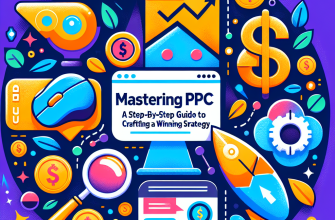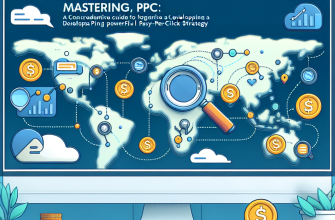- Mastering PPC Strategies on Amazon: Essential Tips for Boosting Your Sales and Visibility
- Understanding Amazon PPC
- Keyword Research: The Foundation of Successful PPC
- Structuring Your Campaigns Efficiently
- Optimizing Product Listings
- Managing Bids and Budgets
- Use of Match Types and Negative Keywords
- Continuous Monitoring and Optimization
- Leveraging Seasonal Trends and Promotions
- Advanced Tactics: Using Amazon DSP
Mastering PPC Strategies on Amazon: Essential Tips for Boosting Your Sales and Visibility
As an e-commerce platform, Amazon offers a vast marketplace with enormous potential for sellers to reach a wide audience. However, with great potential comes fierce competition. Pay-Per-Click (PPC) advertising on Amazon is a powerful tool to enhance your product visibility and drive sales. As a digital marketing expert, I’ve navigated the complexities of Amazon PPC, and I’m here to share some essential strategies that can help you optimize your campaigns, increase your sales, and improve your visibility.
Understanding Amazon PPC
Firstly, it’s crucial to understand what Amazon PPC is and how it works. Amazon PPC is an advertising model where sellers pay a fee to Amazon each time a shopper clicks on their ad. These ads can appear in search results or on product pages and are a direct way to target potential customers who are already in a buying mindset.
Keyword Research: The Foundation of Successful PPC
Keyword research is the cornerstone of any successful PPC campaign. It involves identifying the terms that potential customers use when searching for products like yours. Use tools like Amazon’s own search bar suggestions, Keyword Tool Dominator, or Ahrefs to find relevant keywords. It’s important to categorize your keywords into different campaigns, such as branded, competitors, and generic keywords, to better manage bids and budgets
Structuring Your Campaigns Efficiently
Organizing your PPC campaigns is critical for tracking which ads drive revenue and which ones do not perform well. Structure your campaigns by product categories or by top, middle, and low funnel keywords. This organization helps in allocating budgets more effectively and in tailoring the ad copy to the audience’s intent at different stages of the customer journey.
Optimizing Product Listings
Before you funnel traffic to your products through PPC, ensure your listings are optimized. A well-optimized product listing includes high-quality images, detailed and informative product descriptions, and relevant keywords. Your product title should be clear and include key attributes like brand, size, color, and quantity. Enhanced Brand Content (EBC) or A+ content can also help improve conversion rates by providing additional product benefits and information.
Managing Bids and Budgets
Effective bid management is essential to PPC success. Amazon offers automatic and manual bidding options. While automatic bidding can save time, manual bidding offers greater control over your PPC campaigns. Adjust bids based on the keyword’s performance, considering factors like advertising cost of sales (ACoS) and conversion rates. It’s also crucial to set a daily budget to avoid overspending.
Use of Match Types and Negative Keywords
PPC Strategies on Amazon provides different match types for keywords: broad, phrase, and exact. Broad match offers the widest traffic exposure, while exact match targets more specific customer searches. Utilize a mix of these match types to balance reach and relevance. Additionally, add negative keywords to exclude irrelevant traffic and reduce wasted spend. This helps in refining your audience and increasing the ad’s effectiveness.
Continuous Monitoring and Optimization
PPC Strategies on Amazon is not a set-it-and-forget-it strategy. Continuous monitoring and optimization are necessary to adapt to market changes and improve ROI. Regularly review your campaign performance metrics, such as click-through rate (CTR), ACoS, and overall sales. Experiment with A/B testing for different ad copies and landing pages to determine what resonates best with your target audience.
Leveraging Seasonal Trends and Promotions
Capitalize on seasonal trends and holidays when shoppers are more likely to make purchases. Adjust your PPC campaigns to highlight seasonal products or promotions. This not only increases visibility but also taps into the heightened buyer intent during specific periods
Advanced Tactics: Using Amazon DSP
For sellers looking to expand beyond basic PPC, Amazon Demand Side Platform (DSP) offers advanced advertising solutions that target audiences both on and off Amazon. This can be particularly effective for brand awareness and reaching customers earlier in their buying journey.
Mastering PPC on Amazon requires a blend of strategic planning, ongoing optimization, and a deep understanding of your target audience. By implementing these essential tips, you can significantly boost your product visibility, drive more targeted traffic, and ultimately, increase your sales on Amazon.
Remember, the key to PPC Strategies on Amazon success lies in testing and learning what works best for your specific products and niche. Stay adaptable, keep abreast of Amazon’s evolving features, and continuously refine your strategies. With the right approach, Amazon PPC can be a game-changer for your business, leading to measurable growth and a strong competitive edge.

A seasoned digital marketing strategist with over 8 years of experience across various areas of digital marketing, including SEO, SMM, PPC, content marketing, and email marketing. Specializes in transforming B2B, B2C, e-commerce, and SaaS businesses by creating effective go-to-market strategies and building thriving digital ecosystems. Known for a data-driven approach to optimizing campaigns and maximizing results.
“If your business is looking to scale or in need of a fresh perspective, feel free to contact”.




